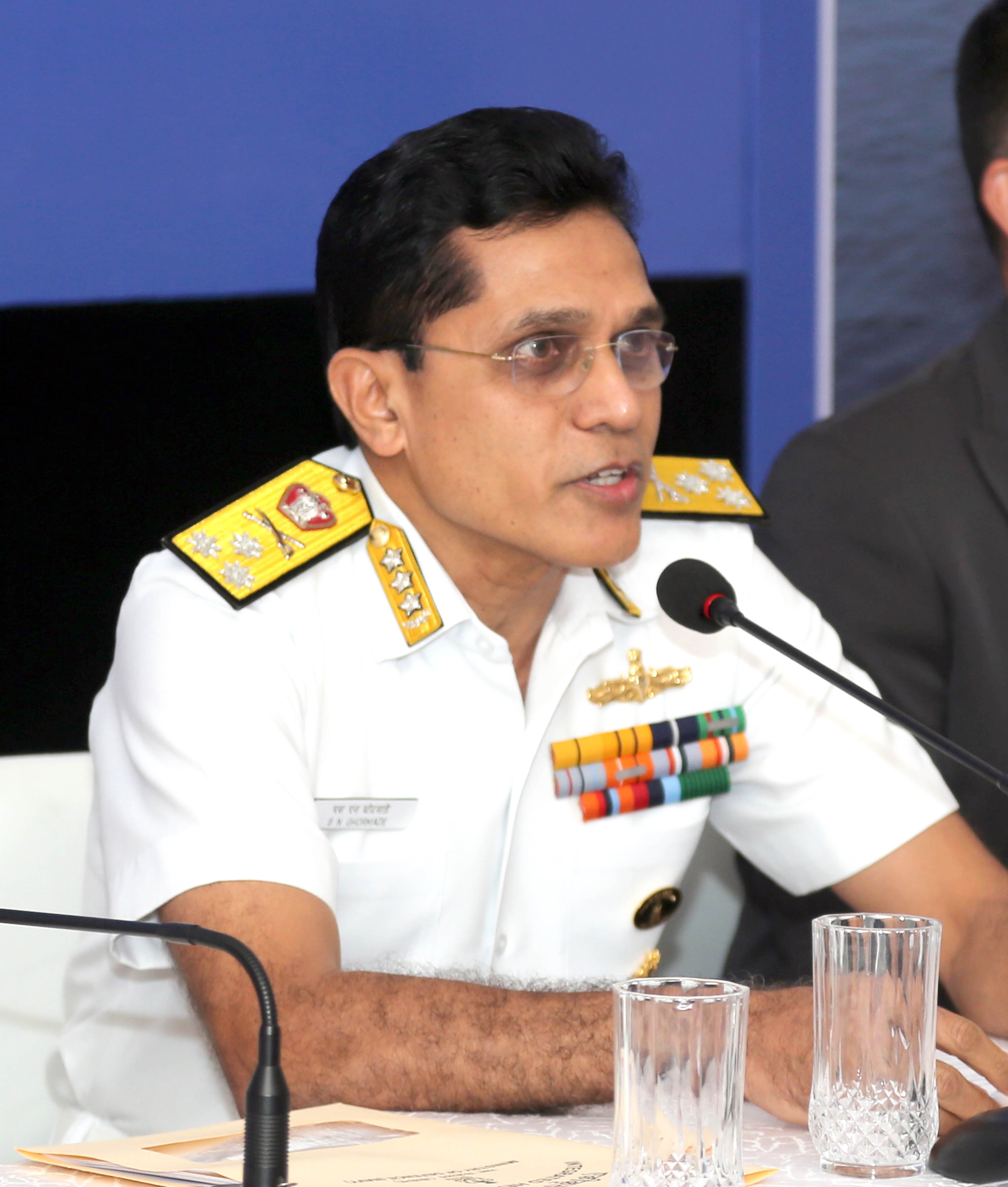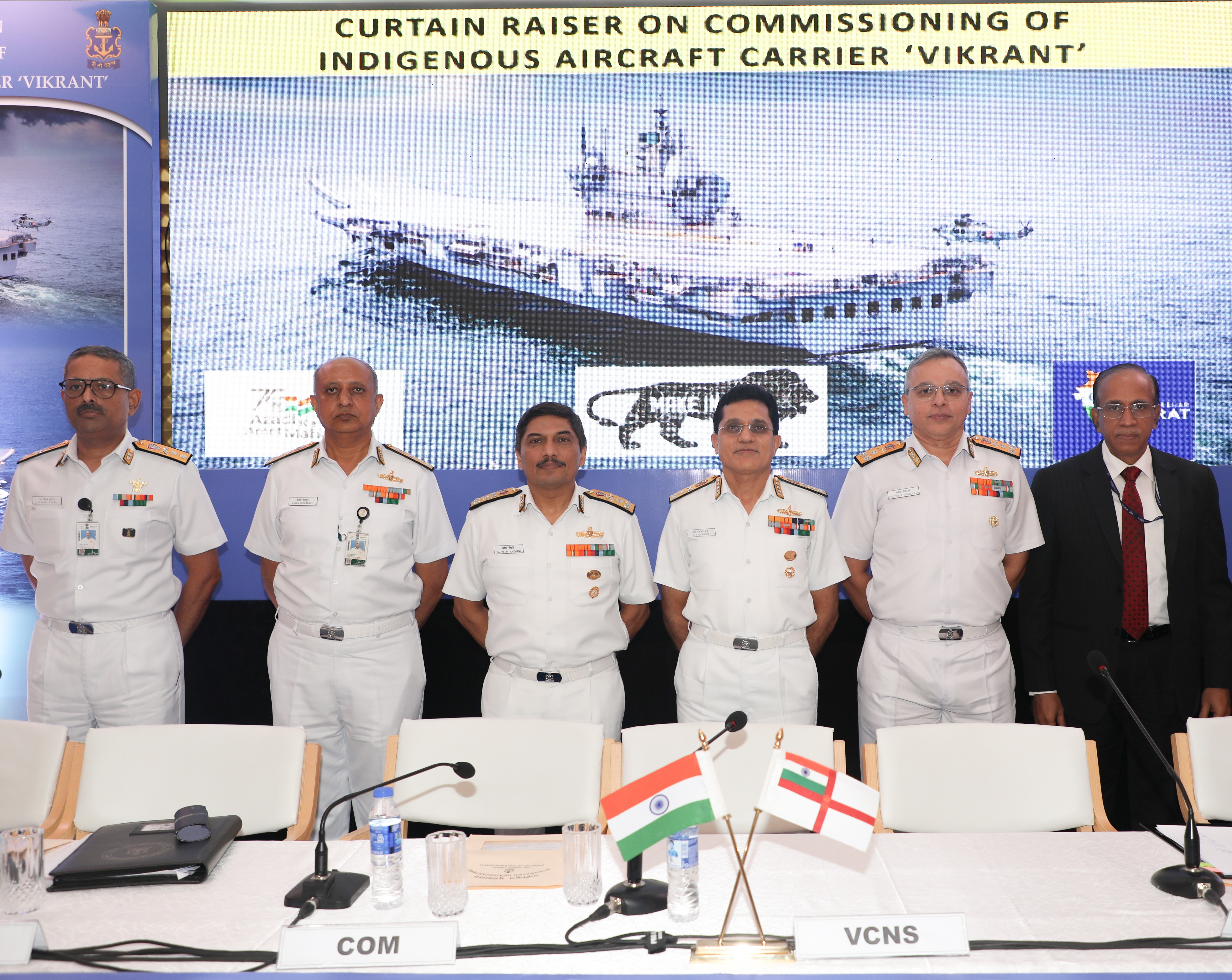02 Sep 2022 will mark the historical milestone of realisation of Nation’s commitment towards ‘AatmaNirbharta’, a landmark date for the Indian Navy and the entire Nation; with Commissioning of first Indigenous Aircraft Carrier (IAC) ‘Vikrant’. Hon’ble Prime Minister would be the Chief Guest on this momentous occasion. Vikrant is the largest warship to have ever been built in India. It is also the first indigenously designed and built Aircraft Carrier for the Indian Navy.
Designed by the Warship Design Bureau (WDB), Indian Navy's in-house organisation and built by M/s Cochin Shipyard Limited (CSL), a Public Sector Shipyard under Ministry of Ports, Shipping & Waterways, the Indigenous Aircraft Carrier is christened after her illustrious predecessor, India’s first Aircraft Carrier which played a vital role in the 1971 war.
Vikrant meaning victorious and gallant, the foundation for prestigious IAC was firmly established in Apr 2005 by ceremonial Steel Cutting. In order to push the indigenisation drive, the Warship grade steel required for construction of IAC was successfully indigenised through Steel Authority of India Limited (SAIL) in collaboration with Defence Research & Development Laboratory (DRDL) and Indian Navy. The hull fabrication was progressed thereafter and the ship’s keel was laid in Feb 2009. The first phase of ship construction was completed with successful launch of the ship in Aug 2013.
The 262 m long and 62 m wide Vikrant displaces approx 43000 T when fully loaded, having a maximum designed speed of 28 Knots with endurance of 7500 NM. The ship has around 2200 compartments, designed for a crew of around 1600 that include specialised cabins to accommodate women officers and sailors. The carrier is designed with a very high degree of automation for machinery operations, ship navigation and survivability. The carrier is equipped with the latest state of the art equipment and systems. (The ship boasts of a fully-fledged state of the art Medical Complex with latest medical equipment facilities that includes major modular OT, emergency modular OT, physiotherapy clinic, ICU, laboratories, CT scanner, X-Ray machines, Dental complex, Isolation ward and telemedicine facilities etc.)
The ship would be capable of operating air wing consisting of 30 aircraft comprising of MiG-29K fighter jets, Kamov-31, MH-60R multi-role helicopters, in addition to indigenously manufactured Advanced Light Helicopters (ALH) and Light Combat Aircraft (LCA) (Navy). Using a novel aircraft-operation mode known as Short Take Off But Arrested Recovery (STOBAR), the IAC is equipped with a ski-jump for launching aircraft, and a set of three ‘arrester wires’ for their recovery onboard.
Inspite of COVID related imponderables and restrictions, adversely affecting availability of OEMs & supply chain, readiness of ship’s propulsion and Power generation equipment/ systems in harbour was tested as part of Basin Trials in Nov 20. ‘Vikrant’ has successfully completed multiple phases of Sea Trials from Aug 21 to till date, where the ship’s performance, including response of ship’s hull to various conditions of operations, manoeuvring trials, main propulsion, Power Generation and Distribution (PGD), ship’s Navigation and Communication systems, endurance testing of propulsion machinery, electrical & electronic suites, deck machinery, lifesaving appliances, integrated trials of majority of equipment/ systems and trials of other auxiliary equipment were ascertained and proved to the satisfaction of Indian Navy’s trials team and ship’s crew.
In line with the prevailing practices being followed by other advanced countries having experience of building Aircraft Carrier, the deck integration trials of fixed wing aircraft and exploitation of Aviation Facility Complex will be carried out post commissioning of the ship when the operational command & control of the ship including flight safety is with the Navy.
‘Vikrant’ has large number of indigenous equipment and machinery, involving major industrial houses in the country viz. BEL, BHEL, GRSE, Keltron, Kirloskar, L&T, Wartsila India etc. as well as over 100 MSMEs. The indigenisation efforts has also led to development of ancillary industries, besides generation of employment opportunities for 2000 CSL personnel and about 13000 employees in ancillary industries thus bolstering plough back effect on Nation’s economy. A major spin off of building an Indigenous Aircraft Carrier is the development and production of indigenous warship grade steel for the ship through partnership between Navy, DRDO and SAIL, which has enabled the country to become self-sufficient with respect to warship steel. Indigenous content of the project is approx. 76%. The Indigenous construction of Aircraft Carrier is a shining example in the Nation’s quest for ‘Aatma Nirbhar Bharat’ and ‘Make in India’ Initiative.
With the commissioning of ‘Vikrant’ on 02 Sep 22, India would join the select group of nations having the niche capability to indigenously design and build an Aircraft Carrier, which will be a real testimony to the Make in India thrust of Government of India.
Commissioning of ‘Vikrant’ would be a proud and landmark moment for the Nation showcasing our Aatma Nirbhar credentials during ‘Azadi ka Amrit Mahotsav’, a true testament to the country’s zeal and fervour in pursuing capability build up towards enhanced maritime security in the Indian Ocean Region and shall demonstrate Indian Navy’s unwavering commitment to contribute towards peace and stability in the region.
The induction and reincarnation of ‘Vikrant’ is thus not only another step towards strengthening our defence preparedness but also our humble tribute to the sacrifices made by our freedom fighters for the independence of the nation and our brave soldiers during the 1971 war.
7LBX.jpeg)


****
VM/JSN